How to Provide the Best Diet for Your Jersey Wooly
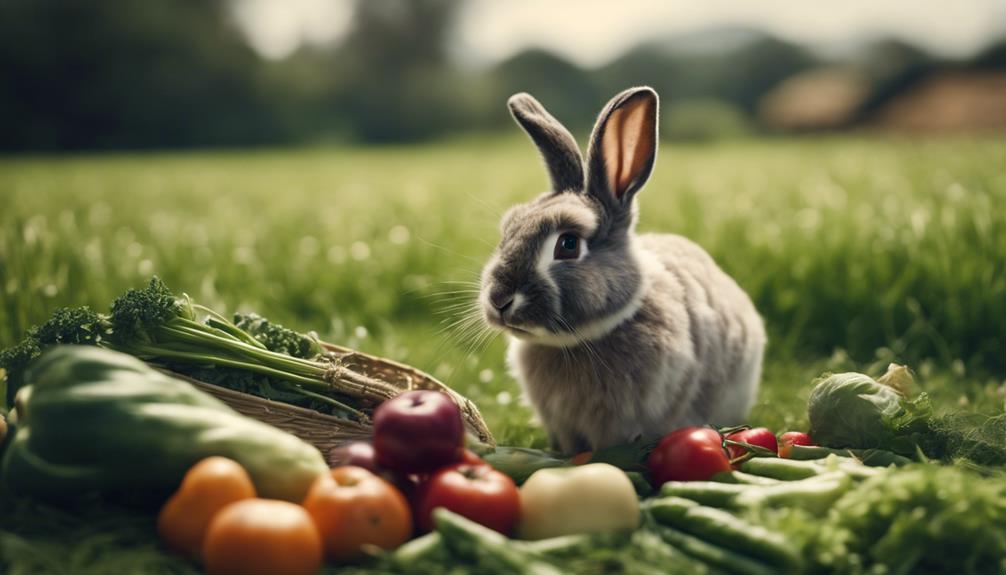
When it comes to ensuring the best diet for your Jersey Wooly rabbit, there are key components that you should consider for a healthy and happy pet.
- Hay: High-quality hay should make up the majority of your rabbit's diet. It helps maintain proper dental health and digestive function.
- Fresh Vegetables: Offer a variety of fresh vegetables daily to provide essential vitamins and minerals. Leafy greens like kale, spinach, and parsley are great options.
- Pellets: Provide a small amount of high-quality rabbit pellets to supplement the hay and vegetables. Make sure the pellets are specifically formulated for rabbits.
- Fresh Water: Always have fresh, clean water available for your rabbit. Change the water daily to ensure freshness.
By incorporating these key components into your Jersey Wooly rabbit's diet, you can help ensure that they stay healthy and happy for years to come.
Nutritional Needs of Jersey Wooly
To ensure the optimal health and well-being of Jersey Wooly rabbits, it's crucial to understand and meet their specific nutritional requirements. These adorable rabbits thrive on a healthy diet consisting mainly of high-quality hay, fresh vegetables, and limited pellets.
Hay, such as Timothy or orchard grass, plays a vital role in their diet by providing essential fiber for digestive health. Fresh water should be provided daily to ensure proper hydration for Jersey Woolies. Monitoring their weight and adjusting feeding amounts accordingly is key to maintaining their overall health.
A balanced diet plan tailored to the individual rabbit's needs is essential. Consulting a vet for dietary advice can help in creating a nutritionally complete diet for your Jersey Wooly. By focusing on providing the right mix of hay, vegetables, and pellets, you can ensure that your Jersey Wooly rabbit stays healthy and happy.
Importance of Hay in Diet
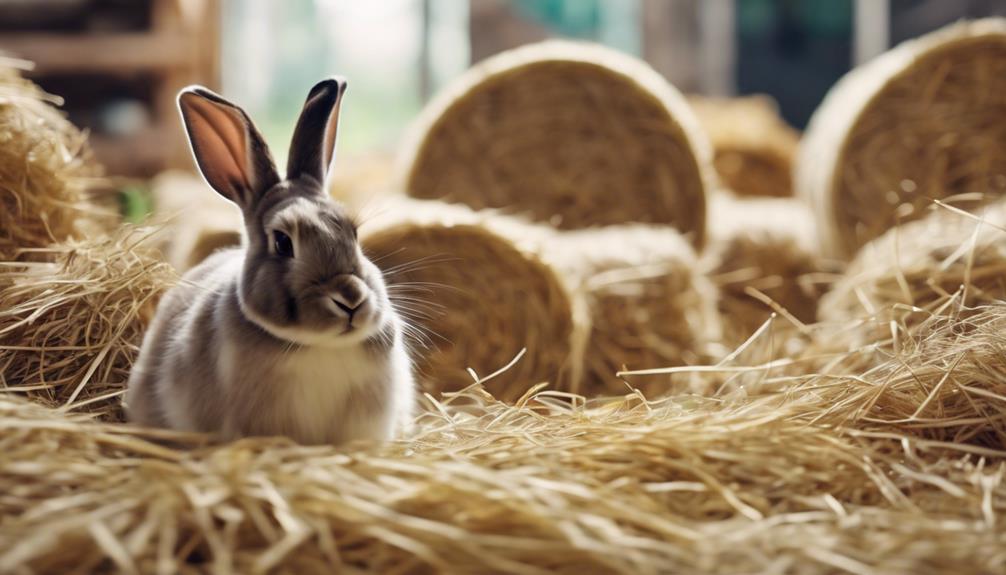
Hay plays a vital role in a Jersey Wooly rabbit's diet as it provides essential fiber crucial for digestion and helps maintain dental health by wearing down their teeth.
Timothy or orchard grass hay is recommended for these rabbits to support their digestive system effectively.
Ensuring hay is always available allows Jersey Woolies to satisfy their natural chewing instincts and promotes overall gut motility and well-being.
Hay for Dental Health
Ensuring a Jersey Wooly rabbit's diet includes an ample amount of hay is crucial for maintaining optimal dental health. Hay plays a vital role in the dental well-being of Jersey Woolies by aiding in wearing down their continuously growing teeth.
The fibrous nature of hay promotes proper chewing, which helps in aligning the teeth correctly and preventing overgrowth issues. Without sufficient hay, rabbits may develop dental problems such as malocclusion, impacting their ability to eat and causing discomfort.
Providing regular access to hay encourages natural tooth grinding behavior, which is essential for overall dental health in Jersey Wooly rabbits. Therefore, incorporating hay into the diet is imperative for supporting healthy dental maintenance and preventing potential dental issues in these adorable furry companions.
Hay for Digestion
For optimal digestive health in Jersey Wooly rabbits, incorporating hay into their diet is essential. Hay provides the necessary fiber to support gut motility and overall gastrointestinal function. Timothy hay and alfalfa hay are particularly beneficial for Jersey Woolies due to their high fiber content and nutritional value.
Here's why hay is crucial for their digestion:
- Fiber Content: Hay is rich in fiber, aiding in proper digestion and preventing gastrointestinal issues.
- Nutritional Benefits: Timothy hay and alfalfa hay offer essential nutrients that support overall health and well-being.
- Dental Health: Chewing on hay helps wear down rabbits' teeth, promoting good dental health and preventing dental problems.
Including hay in a Jersey Wooly's diet is vital for maintaining their digestive system's health and ensuring their overall well-being.
Selecting the Right Pellets
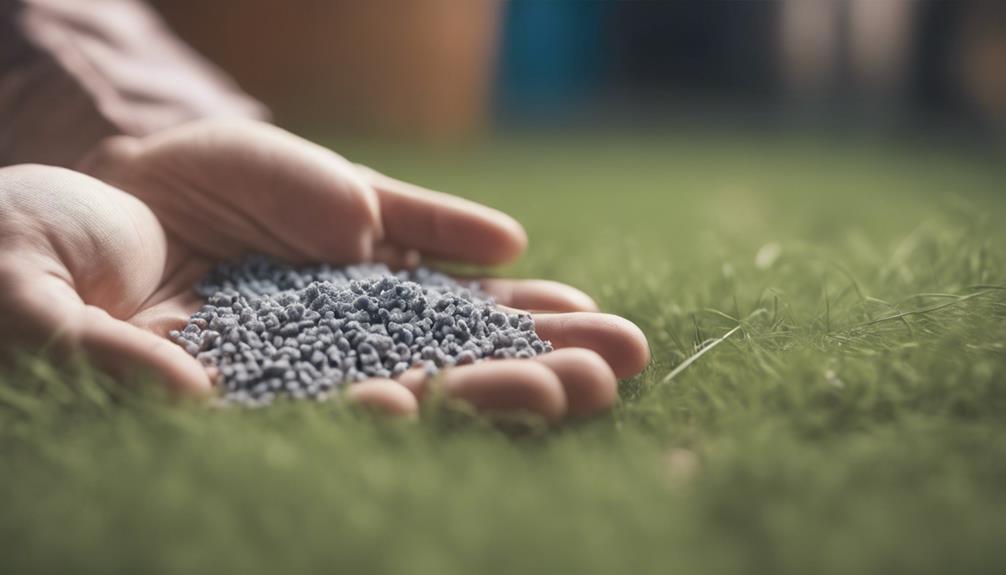
When selecting pellets for your Jersey Wooly, it's crucial to consider the size of the pellets, ensuring they're suitable for your rabbit's small size.
Additionally, checking the quality of ingredients is essential to guarantee your rabbit receives the necessary nutrients.
Lastly, considering the protein content in the pellets can help maintain your Jersey Wooly's overall health and well-being.
Pellet Size Matters
Selecting pellets suitable for small rabbit breeds like the Jersey Wooly involves considering the size and fiber content to ensure optimal nutrition and digestive health for your furry companion. When choosing pellets for your Jersey Wooly, keep the following in mind:
- Specific Formulation: Select pellets specifically designed for small rabbit breeds like the Jersey Wooly to ensure they receive the necessary nutrients.
- Smaller Size: Look for pellets with a smaller size to accommodate the smaller mouths of Jersey Woolies for easier consumption.
- High Fiber Content: Opt for pellets with high fiber content to support the digestive health of your Jersey Wooly rabbit.
Check Ingredient Quality
Considering the dietary needs of Jersey Wooly rabbits, evaluating the ingredient quality of pellets becomes crucial to ensuring their overall health and well-being. When selecting pellets for Jersey Woolies, opt for those with high fiber content (18-22%) to support their digestive health.
It's essential to choose pellets with lower protein levels (14-16%) to prevent obesity in these small rabbits. Avoid pellets with added sugars, seeds, or colored bits, as these can be harmful to Jersey Woolies.
Look for pellets that contain Timothy hay as a primary ingredient for proper nutrition. Additionally, selecting pellets enriched with essential vitamins and minerals is vital to meeting the specific dietary requirements of Jersey Woolies.
Careful consideration of pellet ingredients is key to promoting the best health outcomes for your Jersey Wooly.
Consider Protein Content
Opt for pellets with a protein content ranging from 14-16% to best support the growth and health of Jersey Wooly rabbits. When selecting pellets for your Jersey Woolies, consider the protein content carefully. Here's why it matters:
- Protein Levels: Optimal protein levels in pellets help in the growth and maintenance of your Jersey Wooly's body.
- Avoid Excess: High levels of protein can lead to health issues in rabbits, so it's crucial to maintain a balanced protein intake.
- Consultation: It's advisable to consult with a veterinarian to determine the most suitable pellet options tailored to your Jersey Wooly's specific dietary requirements.
Incorporating Fresh Vegetables
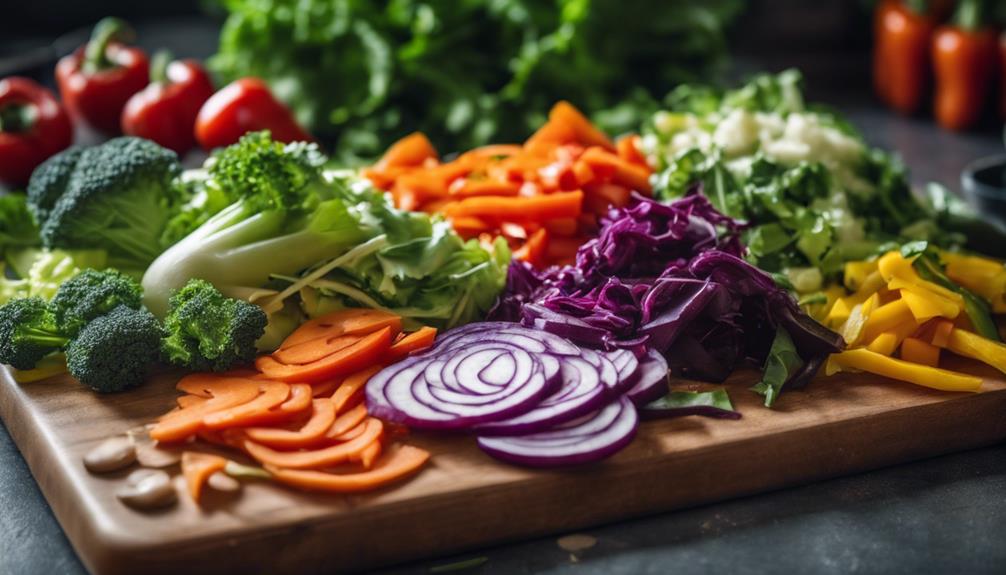
Incorporating a variety of fresh vegetables into the diet of Jersey Wooly rabbits is essential for providing them with vital vitamins, minerals, and fiber necessary for their overall health. Leafy greens like kale, spinach, and romaine lettuce are excellent choices to include in their diet. These vegetables are rich in nutrients that support the well-being of Jersey Woolies. Additionally, carrots, bell peppers, and cucumbers can be tasty and nutritious additions to their vegetable offerings. Introducing new vegetables gradually is important to monitor any digestive sensitivities or allergies in Jersey Wooly rabbits. Below is a table showcasing some recommended fresh vegetables for Jersey Woolies:
| Vegetables | Benefits |
|---|---|
| Kale | High in vitamins A, C, K |
| Spinach | Rich in iron and calcium |
| Romaine Lettuce | Good source of fiber |
| Carrots | High in beta-carotene |
Avoiding Harmful Foods
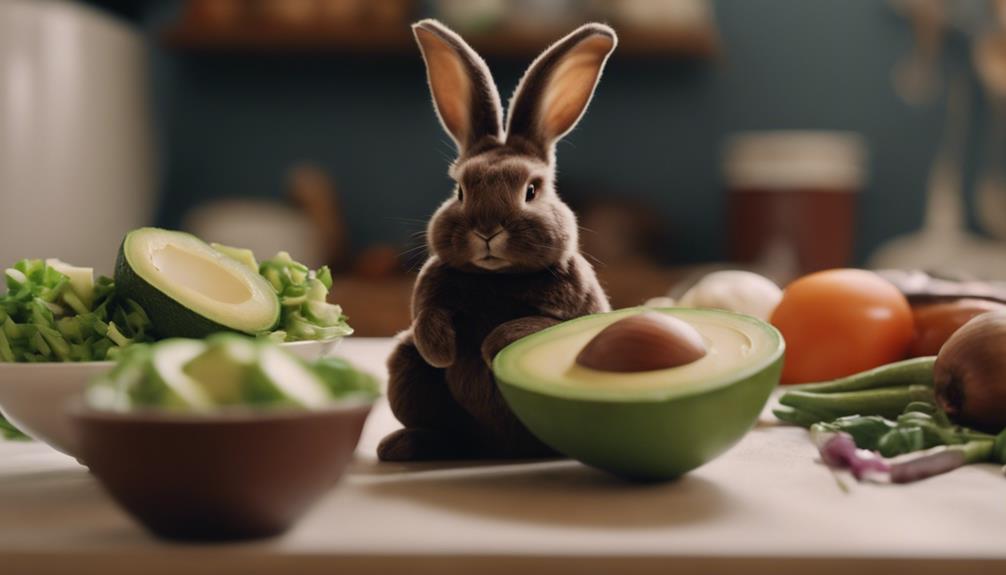
When selecting foods for your Jersey Wooly rabbits, it's crucial to be mindful of items that could be harmful to their health and well-being. Here are some harmful foods to avoid in your rabbit's diet:
- High Sugar and Carbohydrate Foods: Foods high in sugar or carbohydrates can lead to obesity and dental issues in Jersey Woolies. Avoid sugary treats like candy or soda to maintain a healthy diet for your rabbit.
- Toxic Foods: Chocolate, caffeine, avocado, onions, garlic, and high-fat foods should be kept away from your rabbit. These items can cause digestive problems and potential toxicity, leading to severe health issues.
- Dairy Products: Dairy isn't recommended for Jersey Wooly rabbits as it can lead to gastrointestinal discomfort and upset stomachs. It's best to steer clear of dairy products when planning your rabbit's diet to prevent any digestive issues.
Always prioritize your rabbit's health by researching and consulting with a veterinarian to ensure you're providing a safe and appropriate diet for your Jersey Wooly.
Hydration and Water Intake

To ensure optimal health and well-being for your Jersey Wooly rabbit, maintaining proper hydration through access to fresh, clean water is essential. Water intake plays a crucial role in the overall health of your rabbit. Providing fresh water daily is vital to prevent dehydration and related health issues.
Consider using a ball waterer to ensure the water stays clean and easily accessible for your Jersey Wooly. In colder weather, it's important to prevent the water from freezing. You can use a heated waterer or replace the water in crocks twice a day to avoid freezing.
Monitoring your rabbit's water intake is key to ensuring they're properly hydrated. Proper hydration is fundamental for the well-being and maintenance of good health in Jersey Woolies. By paying attention to your rabbit's water consumption and making clean water readily available, you can help support their overall health and happiness.
Monitoring Your Rabbit's Diet
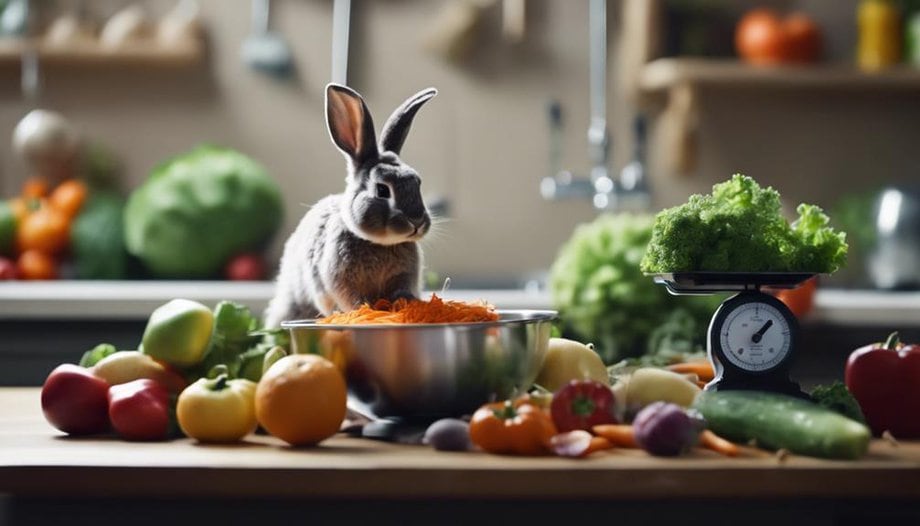
Monitoring your Jersey Wooly rabbit's diet involves careful observation of food portions and types to ensure balanced nutrition and prevent health issues such as obesity. To effectively monitor your rabbit's diet, follow these guidelines:
- Measure the amount of pellets: Pellets should make up a small portion of your rabbit's diet, around 1/4 cup per 5 pounds of body weight daily. Overfeeding pellets can lead to obesity and other health issues.
- Keep track of hay, vegetables, and treats: The majority of your rabbit's diet should consist of hay, fresh vegetables, and occasional treats. Ensure a variety of vegetables are offered daily, and limit sugary treats to prevent digestive problems.
- Regularly observe weight and body condition: Monitor your rabbit's weight and body condition to adjust their diet as needed. Changes in appetite, digestion, or energy levels may indicate a need for dietary adjustments.
Consult with a veterinarian for personalized dietary recommendations based on your rabbit's individual needs.
Frequently Asked Questions
What Does Jersey Wooly Eat?
Jersey Wooly rabbits primarily eat high-quality hay, fresh vegetables, and limited pellets for essential nutrients. They can benefit from supplements like alfalfa hay. Fresh water should be provided daily. Transitioning to new food should be gradual.
How Much Should a Jersey Wooly Weigh?
A Jersey Wooly's weight management is crucial for its health. Regular monitoring, considering growth stages, and adjusting exercise and portion control are key. Consult a vet for guidance on the ideal weight range.
What Is the Lifespan of a Jersey Wooly?
A Jersey Wooly rabbit typically lives between 7 to 10 years. Regular grooming, appropriate exercise, and veterinary care contribute to their longevity. These fluffy companions enjoy a relatively long lifespan when provided with proper care and attention.
What Is the Ideal Diet for a Rabbit?
Rabbits benefit from a diet rich in high-quality hay, fresh veggies, limited pellets, and occasional treats. This diet meets their nutritional requirements, promoting overall health and preventing issues like GI stasis. Fresh water should always be available for hydration and digestion.









